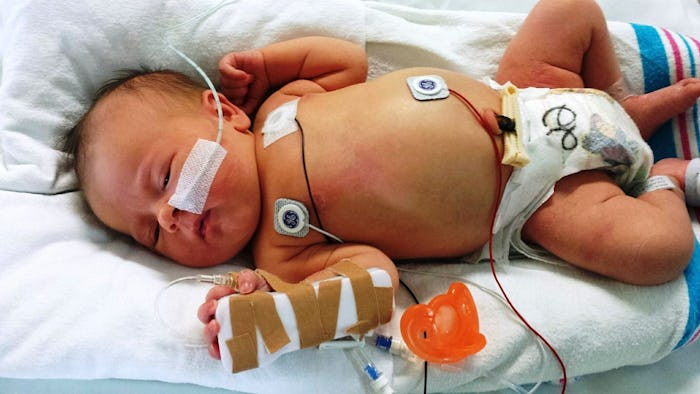Life
Premature Birth Rates By State Show The Numbers Are Growing, & It's Horrifying
When any woman is pregnant, the most important thing to her is that her baby is born healthy. Expectant mothers research midwives, debate whether to have C-sections and epidurals, all so they can have a positive birth experience. But what if something unexpected happens? What if your baby is born early? Unfortunately, that seems to be the case all across America. Here are premature birth rates by state in America, so you can find out where having your baby early is far too common.
More than 10 percent of babies born in America are born before 37 weeks of pregnancy, according to the Centers for Disease Control and Prevention. Babies born prematurely (also known as pre-term births) are more likely to have breathing problems, cerebral palsy, hearing impairment and developmental delays. And it's horrifying, but pre-term babies are more likely to die within a year of their birth than full-term babies are.
“These babies often have to spend a long time in the hospital and have chronic medical problems once they go home,” Dr. Allison Bryant Mantha, an OB-GYN at Massachusetts General Hospital, said in an interview with SELF.
What's scariest is that the number of pre-term births is going up. And some parts of the country are facing worse rates of pre-term births than others.
The three states that the March of Dimes gave "F" grades to on its "Premature Birth report card" (which means that they have pre-term birth rates over 11.5 percent) are Alabama, Louisiana, and Mississippi. What's interesting is that the states with the worst rates of premature births are all extremely regionally concentrated — six of the states that received "D" grades are in the south as well.
The March of Dimes aims to lower the pre-term birth rate to 8.1 percent. Mississippi's pre-term birth rate? A huge 13 percent. Michele King, a spokesperson for the March of Dimes, told Romper that many Southern states have higher rates for the risk factors related to premature birth. Several states in the South have less health care coverage and high rates of smoking.
Not having health insurance makes women less likely to receive prenatal care, according to ACOG, which is extremely important in preventing pre-term birth.
However, the King also told Romper that these risk factors may not be the only reasons why pregnancy outcomes are worse in the South:
However, epidemiologists have found that even when rates are adjusted for many known risk factors, including race/ethnicity, education level, smoking, etc., many of the southern states still have the highest rates of pre-term birth as well as other poor health outcomes. This says that we do not yet fully understand all of the reasons for disparities by geographic region.
The spokesperson also added that campaigns encouraging mothers to "not get pregnant again until at least 18 months after giving birth" can help to prevent pre-term births.
So which states are doing well? Four states earned an A on the report card, meaning they have a premature birth rate of 8.1 percent or less. Those states were New Hampshire, Oregon, Vermont and Washington. According to the March of Dimes, Vermont had a rate of 7.3 percent, while Oregon had a rate of 7.6 percent.
In Vermont, pre-term births have been prevented because of programs such as the Vermont Regional Perinatal Program, which transfers high-risk pregnant women from smaller hospitals to larger ones. Vermont also has a low uninsured population, which encourages pregnant women to get prenatal care.
Making sure mothers everywhere know what to do to have a healthy pregnancy is key to ending the rise of pre-term birth rates.
"We want every baby, no matter where they're born, no matter their birth ethnicity, to be born with the best start in life," Chief Medical Officer of March of Dimes Edward McCabe told NPR. "Every woman is trying to do the best that she can. We need to show her what can be done."
This article was originally published on
